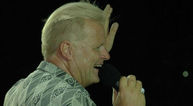
Last week’s gospel festival in Makassar, Indonesia, was planned as an outreach to the 2.6 million-strong Makassar people with less than 500 believers. No one could have predicted the outcome—capacity crowds, amazing healings, death threats and on the last day Peter Youngren being called to the police headquarters to be interrogated for ‘blasphemy against Islam,’ a crime that carries a five-year prison sentence.
After pressure from Muslim extremists and with only one day to go until the festival, the city mayor canceled the permit for the event to be held on the huge open grounds in the center of the city. It seemed that all was lost, but God had other plans.
“In spite of everything that happened, this has been one of the most amazing weeks in 30 years of gospel ministry because of how God turned this around,” Youngren says.
The Youngren ministry has conducted 26 gospel festivals in Indonesia since the year 2000, and only twice has a stadium or outdoor venue been canceled due to security reasons.
After pressure from Muslim extremists and with only one day to go until the festival, the city mayor canceled the permit for the event to be held on the huge open grounds in the center of the city. It seemed that all was lost, but God had other plans.
“In spite of everything that happened, this has been one of the most amazing weeks in 30 years of gospel ministry because of how God turned this around,” Youngren says.
The Youngren ministry has conducted 26 gospel festivals in Indonesia since the year 2000, and only twice has a stadium or outdoor venue been canceled due to security reasons.
“The other two times we felt a sense of loss that we had missed an opportunity to present the gospel, but this time was different,” explains Youngren.
The opposition started three days before the scheduled event. Newspapers carried reports that Muslim organizations demanded that the government cancel all permits. According to festival coordinator, Johan Olehall, Muslim leaders had expressed to him that their real concern was that healings would cause Muslims to become Christians. Olehall’s assurances that this is an event to present Jesus Christ, not a religion, did not persuade them. One of the team members received a death threat, “Go home all of you or we will kill you, none of you are safe.”
After the permits were canceled, a large alternate site was secured, but within hours of this new development being announced in newspapers, 1,500 radicals gathered, threatening to riot unless the mayor canceled this new venue as well.
Again it looked hopeless, but God had already prepared a solution by speaking to a local pastor of a large congregation with primarily Chinese believers. The 2,500 chairs in the church's auditorium were removed, doubling or tripling the capacity by having standing room only—wall-to-wall people. Then two parking lots and a large hall were connected through video screens, providing room for thousands more outside the main auditorium.
Now only one question remained: Would Muslims, ordinary Makassar people, come to a building owned by a church—normally a taboo? With only an hour to advertise this new venue, eager believers positioned themselves on the street directing people to the church grounds. Soon every part of the property, indoor and outdoor, was covered with people. One Assemblies of God pastor commented, “I have never seen such crowds of Muslims come to a church property, this is unheard of here.”
First in line of what was to be hundreds of healing testimonies, a woman, carried in on a bed, was healed and with tears streaming down her face as she told what Jesus had done, while people shouted, “We know her, we know her.” Each testimony was interrupted with intense praise and worship. One North American social worker, who has lived in Indonesia for 10 years, commented, “It was amazing to see Muslims inside a church building with their hands raised in worship, singing praise to Jesus. God was obviously doing a deep work in them.”
The people outside, watching on the big screens, had been told to approach designated ushers to report when Jesus healed them and then the ushers would help them get to the platform to share their testimony. In order to not offend the extremists, Muslim women were asked to remove their head-dresses before testifying.
Just about when everything seemed to be smooth sailing, Youngren was ordered to come to the police station to face interrogation concerning “blasphemy against Islam.” At issue was an open letter from Youngren published in Makassar’s largest newspaper a few days earlier. The letter had stated that Muhammad said in the Quran that Muslims are allowed to associate with Christians that “do not act arrogantly” and that the gospel festival in Makassar was to be conducted in friendship and respect for all people, while focusing on Jesus Christ.
The Muslim extremist had laid charges that Islam was blasphemed because Youngren did not attribute the words of the Quran to God, but to Muhammad. As trivial as this may seem, the face-to-face meeting with the Muslim extremists, followed by interrogation by police officers, lasted for 3 1/2 hours.
With only an hour to go before Youngren was to speak, he was free to leave the police headquarters. The pastor, who translated during the interrogation, commented, “I had a feeling that the police in their hearts were really on our side.” The matter remains in the hands of Indonesian authorities.
That night the theme was, “How I know Jesus Is Alive.” Thousands responded to the call to repent and believe in Christ, followed by many testimonies of miracles. The key to this breakthrough for the gospel, in spite of the setbacks, was local pastors and believers standing together and moving forward undeterred by the obstacles.
“My heart is filled with gratitude for the faith and love demonstrated by pastors and local believers; they stood strong through all the challenges,” Youngren notes. Local pastors are already talking about another gospel festival inviting Youngren to come back, this time at the venue originally advertised.
The opposition started three days before the scheduled event. Newspapers carried reports that Muslim organizations demanded that the government cancel all permits. According to festival coordinator, Johan Olehall, Muslim leaders had expressed to him that their real concern was that healings would cause Muslims to become Christians. Olehall’s assurances that this is an event to present Jesus Christ, not a religion, did not persuade them. One of the team members received a death threat, “Go home all of you or we will kill you, none of you are safe.”
After the permits were canceled, a large alternate site was secured, but within hours of this new development being announced in newspapers, 1,500 radicals gathered, threatening to riot unless the mayor canceled this new venue as well.
Again it looked hopeless, but God had already prepared a solution by speaking to a local pastor of a large congregation with primarily Chinese believers. The 2,500 chairs in the church's auditorium were removed, doubling or tripling the capacity by having standing room only—wall-to-wall people. Then two parking lots and a large hall were connected through video screens, providing room for thousands more outside the main auditorium.
Now only one question remained: Would Muslims, ordinary Makassar people, come to a building owned by a church—normally a taboo? With only an hour to advertise this new venue, eager believers positioned themselves on the street directing people to the church grounds. Soon every part of the property, indoor and outdoor, was covered with people. One Assemblies of God pastor commented, “I have never seen such crowds of Muslims come to a church property, this is unheard of here.”
First in line of what was to be hundreds of healing testimonies, a woman, carried in on a bed, was healed and with tears streaming down her face as she told what Jesus had done, while people shouted, “We know her, we know her.” Each testimony was interrupted with intense praise and worship. One North American social worker, who has lived in Indonesia for 10 years, commented, “It was amazing to see Muslims inside a church building with their hands raised in worship, singing praise to Jesus. God was obviously doing a deep work in them.”
The people outside, watching on the big screens, had been told to approach designated ushers to report when Jesus healed them and then the ushers would help them get to the platform to share their testimony. In order to not offend the extremists, Muslim women were asked to remove their head-dresses before testifying.
Just about when everything seemed to be smooth sailing, Youngren was ordered to come to the police station to face interrogation concerning “blasphemy against Islam.” At issue was an open letter from Youngren published in Makassar’s largest newspaper a few days earlier. The letter had stated that Muhammad said in the Quran that Muslims are allowed to associate with Christians that “do not act arrogantly” and that the gospel festival in Makassar was to be conducted in friendship and respect for all people, while focusing on Jesus Christ.
The Muslim extremist had laid charges that Islam was blasphemed because Youngren did not attribute the words of the Quran to God, but to Muhammad. As trivial as this may seem, the face-to-face meeting with the Muslim extremists, followed by interrogation by police officers, lasted for 3 1/2 hours.
With only an hour to go before Youngren was to speak, he was free to leave the police headquarters. The pastor, who translated during the interrogation, commented, “I had a feeling that the police in their hearts were really on our side.” The matter remains in the hands of Indonesian authorities.
That night the theme was, “How I know Jesus Is Alive.” Thousands responded to the call to repent and believe in Christ, followed by many testimonies of miracles. The key to this breakthrough for the gospel, in spite of the setbacks, was local pastors and believers standing together and moving forward undeterred by the obstacles.
“My heart is filled with gratitude for the faith and love demonstrated by pastors and local believers; they stood strong through all the challenges,” Youngren notes. Local pastors are already talking about another gospel festival inviting Youngren to come back, this time at the venue originally advertised.


 RSS Feed
RSS Feed